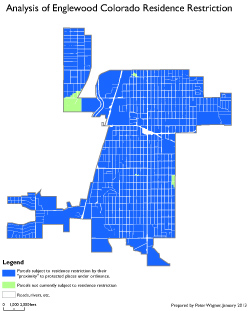PPI helps overturn a harmful banishment ordinance in Colorado
Peter Wagner was an expert witness in the case, finding that the ordinance essentially amounted to complete banishment from the city of Englewood.
by Peter Wagner, August 23, 2013

The map that I prepared for the case (area in blue is off limits).
The ACLU of Colorado has announced that federal Judge R. Brooke Jackson has invalidated an Englewood, Colorado city ordinance that severely restricts where persons convicted of certain sex offenses can live, ruling that the ordinance violates the Colorado Constitution.
I was an expert witness in the case, and I found that the ordinance essentially amounted to complete banishment from the city of Englewood. Judge Jackson summarized my findings in his opinion:
During trial the City presented a map showing the parts of the City that are off limits under Ordinance 34 as well as a list of residence addresses that are located in parts of the City that are unrestricted. Exhibit 7. The result, according to the City, is that 209 addresses within the City are not restricted, of which 126 addresses are residential. However, according to Peter Wagner, plaintiff’s geographic information systems and mapping expert, the correct number of parcels available to sex offenders is 55 unrestricted parcels out of 11,314 parcels total in the City. Either way approximately 99% of the City is off-limits to most sex offenders.
The case was brought by the ACLU of Colorado and pro bono counsel from Faegre Baker Daniels LLP. For more on our other litigation efforts on prison gerrymandering and the issue of banishment of people on sex offender registries, see our litigation page.




[…] this year, including a legal victory for improved sentencing practice in Massachusetts, and overturning a counterproductive banishment ordinance in a Colorado […]